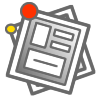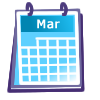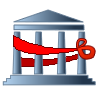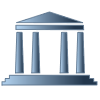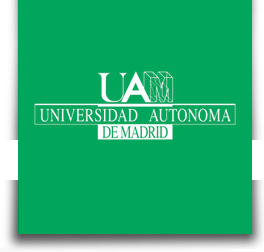 Cursos deportivos y actividades culturales 2 sem 2017. Atención
Cursos deportivos y actividades culturales 2 sem 2017. Atención
Bernardo González Mella 11 Jul 201711/07/17 a las 18:50 hrs.2017-07-11 18:50:11

 Cursos deportivos y actividades culturales 2 sem 2017
Cursos deportivos y actividades culturales 2 sem 2017
Bernardo González Mella 10 Jul 201710/07/17 a las 15:16 hrs.2017-07-10 15:16:10
 Montaje teatral "Diario de duelo"
Montaje teatral "Diario de duelo"
Bernardo González Mella 6 Jul 201706/07/17 a las 13:41 hrs.2017-07-06 13:41:06
 Diplomado Holocausto -Shoah- Genocidio y Derechos Humanos
Diplomado Holocausto -Shoah- Genocidio y Derechos Humanos
Bernardo González Mella 6 Jul 201706/07/17 a las 13:37 hrs.2017-07-06 13:37:06
 Diplomado Edición Profesional: publicaciones impresas y digitales
Diplomado Edición Profesional: publicaciones impresas y digitales
Cristián Vergara 6 Jul 201706/07/17 a las 13:32 hrs.2017-07-06 13:32:06
El Diplomado en Edición Profesional de la Facultad de Filosofía y Humanidades de la Universidad de Chile está orientado a la capacitación y profundización en el manejo de herramientas teóricas y prácticas que favorezcan el ejercicio del oficio editorial, así como a potenciar la reflexión propositiva dentro de un medio cultural cambiante.
Los estudiantes integrarán conocimientos, destrezas y competencias en el ejercicio práctico del oficio editorial, al mismo tiempo que desarrollarán habilidades comprensivas para responder a las necesidades del entorno, mediante metodologías que potencien la fusión del aprendizaje teórico y los modos convencionales y digitales de edición de contenidos.
Teléfono:
+562 29787011
E-mail:
diplomaedicionprofesional@gmail.com
Más información en uchile.cl/f112241
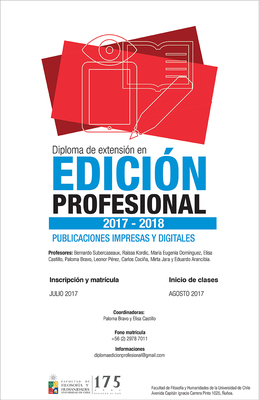
Los estudiantes integrarán conocimientos, destrezas y competencias en el ejercicio práctico del oficio editorial, al mismo tiempo que desarrollarán habilidades comprensivas para responder a las necesidades del entorno, mediante metodologías que potencien la fusión del aprendizaje teórico y los modos convencionales y digitales de edición de contenidos.
Teléfono:
+562 29787011
E-mail:
diplomaedicionprofesional@gmail.com
Más información en uchile.cl/f112241

 Curso de Extensión "Lecturas sobre Arte Religioso"
Curso de Extensión "Lecturas sobre Arte Religioso"
Cristián Vergara 6 Jul 201706/07/17 a las 12:59 hrs.2017-07-06 12:59:06
El presente curso de extensión está dirigido a toda persona interesada en el arte religioso en general, con particular énfasis en las tradiciones cristiana e islámica. Este curso abordará el problema de la representación de lo divino a través de diversas formas artísticas, tales como la práctica iconográfica cristiana (pintura al temple), la producción de mosaicos y patrones geométricos islámicos, y las lecturas que artistas modernos y contemporáneos han realizado como una manera de reinterpretar dichas tradiciones artístico-culturales.
31 de julio al 30 de agosto
Más información en uchile.cl/f134783

31 de julio al 30 de agosto
Más información en uchile.cl/f134783

 Social Epistemology Workshop Series
Social Epistemology Workshop Series
Cristián Vergara 6 Jul 201706/07/17 a las 12:55 hrs.2017-07-06 12:55:06
Workshop abierto a estudiantes de pregrado y postgrado, profesores y otros interesados.
Inscripciones al correo electrónico workshopepistemologia@gmail.com indicando nombre, universidad y carrera de origen, además de una breve explicación de interés en el seminario (máximo 5 líneas).
Las sesiones serán dictadas en inglés. No es obligatorio hablar inglés, aunque sí se debe comprender el idioma. Se enviará un breve bibliografía sugerida para cada sesión.
Cupos limitados
Programa
Session One
Epistemic Dependence and Learning from Testimony
Miércoles 16 de agosto
We acquire many of our beliefs through the testimony of others. Indeed, if you want to know much about anything, it seems you must rely on testimony a great deal of the time. We trust our friends and families, from whom we learn all about the world beyond our own experience. For most of us, if we know anything at all about science or history, we know it because we learnt it from our teachers at school and from the testimony of public intellectuals. Presumably, we would all like to have justified beliefs (other things being equal, at least). Perhaps beliefs are justified if they are supported by our evidence, or if they are reliably or responsibly formed. So, when and why should we believe what we are told? How are the beliefs we gain through testimony justified? In this workshop, we will investigate the nature of testimony: What is it? When do we rely on testimony? When does testimony give us justified beliefs?
Session Two
Epistemic Injustice
Viernes 18 de agosto
Some people suffer the injustice of having their testimony undervalued or ignored completely, because of irrelevant facts about their social position. Women’s contributions to supposedly ‘male’ domains are all too often treated dismissively. The testimony of religious and ethnic minorities backgrounds is sometimes excluded from the political discourse. This is testimonial injustice; a kind of epistemic injustice. Another kind of epistemic injustice, called hermeneutical injustice, occurs when an important part of someone’s social experience is hidden or distorted from collective understanding. In this workshop, will investigate epistemic injustice: Who are the victims of epistemic injustice? What kinds of harms does epistemic injustice cause? What can we do to help prevent epistemic injustice?
Session Three
Disagreement
Martes 29 de agosto
We do not always agree. Seemingly reasonable and well-informed people disagree on diverse matters, from religion and politics to history, science and current affairs. In an open society, we should tolerate disagreement. That is easily said, but what should you do, when you find out that one of your peers disagrees with you? To answer this question is important not only for philosophy but also for the democratic way of life. Should you stick to your guns and ignore the fact someone disagrees with you? You might think that is too dogmatic. So, perhaps you should suspend your judgement about the answer to a question when you find someone disagrees with you about it. This, however, seems too pliant. Perhaps, then, we should think of the fact that someone disagrees with us as evidence. In this workshop, we will investigate the epistemology of disagreement: When does disagreement matter? What is the epistemological significance of disagreement? What should we do, when we find out about disagreement?
Session Four
Knowledge and the Epistemic Value of the Internet
Jueves 31 de agosto
Unrestricted access to information is a public good. The internet may be the single best resource we have in securing that good. On the internet, knowledge can be aggregated and disseminated across the world in seconds and without being easily restricted or censored. Researchers can collaborate across borders, and their research can be shared with public. Wikipedia and other online encyclopaedias gives us free access to immense libraries of information. Blogging allows us to contribute our own expertise to the public good. We can choose where we read the news and try to get a clear picture of current affairs. Surely, in an open society, such easy access to knowledge is a public good. However, using the internet can be epistemically risky. The personalisation of our engagement with the resources of the internet has led to the emergence of the ‘Daily Me’: We read only what we want to read, and easily avoid dissenting perspectives. This means that we are often trapped in an echo-chamber of our own prejudices. We think we are getting a clear picture of the facts but we end up polarised; whatever our starting point, we end up with more confidence in more extreme beliefs. In this workshop, we will investigate the epistemology of the internet: What epistemic goods does the internet provide? What are the epistemic risks? And what (if anything) can we do to help improve the internet?
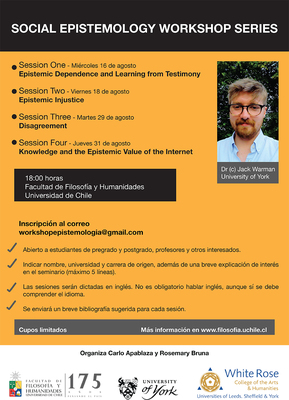
Inscripciones al correo electrónico workshopepistemologia@gmail.com indicando nombre, universidad y carrera de origen, además de una breve explicación de interés en el seminario (máximo 5 líneas).
Las sesiones serán dictadas en inglés. No es obligatorio hablar inglés, aunque sí se debe comprender el idioma. Se enviará un breve bibliografía sugerida para cada sesión.
Cupos limitados
Programa
Session One
Epistemic Dependence and Learning from Testimony
Miércoles 16 de agosto
We acquire many of our beliefs through the testimony of others. Indeed, if you want to know much about anything, it seems you must rely on testimony a great deal of the time. We trust our friends and families, from whom we learn all about the world beyond our own experience. For most of us, if we know anything at all about science or history, we know it because we learnt it from our teachers at school and from the testimony of public intellectuals. Presumably, we would all like to have justified beliefs (other things being equal, at least). Perhaps beliefs are justified if they are supported by our evidence, or if they are reliably or responsibly formed. So, when and why should we believe what we are told? How are the beliefs we gain through testimony justified? In this workshop, we will investigate the nature of testimony: What is it? When do we rely on testimony? When does testimony give us justified beliefs?
Session Two
Epistemic Injustice
Viernes 18 de agosto
Some people suffer the injustice of having their testimony undervalued or ignored completely, because of irrelevant facts about their social position. Women’s contributions to supposedly ‘male’ domains are all too often treated dismissively. The testimony of religious and ethnic minorities backgrounds is sometimes excluded from the political discourse. This is testimonial injustice; a kind of epistemic injustice. Another kind of epistemic injustice, called hermeneutical injustice, occurs when an important part of someone’s social experience is hidden or distorted from collective understanding. In this workshop, will investigate epistemic injustice: Who are the victims of epistemic injustice? What kinds of harms does epistemic injustice cause? What can we do to help prevent epistemic injustice?
Session Three
Disagreement
Martes 29 de agosto
We do not always agree. Seemingly reasonable and well-informed people disagree on diverse matters, from religion and politics to history, science and current affairs. In an open society, we should tolerate disagreement. That is easily said, but what should you do, when you find out that one of your peers disagrees with you? To answer this question is important not only for philosophy but also for the democratic way of life. Should you stick to your guns and ignore the fact someone disagrees with you? You might think that is too dogmatic. So, perhaps you should suspend your judgement about the answer to a question when you find someone disagrees with you about it. This, however, seems too pliant. Perhaps, then, we should think of the fact that someone disagrees with us as evidence. In this workshop, we will investigate the epistemology of disagreement: When does disagreement matter? What is the epistemological significance of disagreement? What should we do, when we find out about disagreement?
Session Four
Knowledge and the Epistemic Value of the Internet
Jueves 31 de agosto
Unrestricted access to information is a public good. The internet may be the single best resource we have in securing that good. On the internet, knowledge can be aggregated and disseminated across the world in seconds and without being easily restricted or censored. Researchers can collaborate across borders, and their research can be shared with public. Wikipedia and other online encyclopaedias gives us free access to immense libraries of information. Blogging allows us to contribute our own expertise to the public good. We can choose where we read the news and try to get a clear picture of current affairs. Surely, in an open society, such easy access to knowledge is a public good. However, using the internet can be epistemically risky. The personalisation of our engagement with the resources of the internet has led to the emergence of the ‘Daily Me’: We read only what we want to read, and easily avoid dissenting perspectives. This means that we are often trapped in an echo-chamber of our own prejudices. We think we are getting a clear picture of the facts but we end up polarised; whatever our starting point, we end up with more confidence in more extreme beliefs. In this workshop, we will investigate the epistemology of the internet: What epistemic goods does the internet provide? What are the epistemic risks? And what (if anything) can we do to help improve the internet?

 Beca Univ Autónoma de Madrid
Beca Univ Autónoma de Madrid
Bernardo González Mella 4 Jul 201704/07/17 a las 19:54 hrs.2017-07-04 19:54:04
 Semestre en Alemania para aprendizaje del idioma
1
Semestre en Alemania para aprendizaje del idioma
1
Bernardo González Mella 4 Jul 201704/07/17 a las 19:49 hrs.2017-07-04 19:49:04
 La Anarquía en Chile (1823-1833), ¿década maldita o epopeya liberal?
La Anarquía en Chile (1823-1833), ¿década maldita o epopeya liberal?
Cristián Vergara 3 Jul 201703/07/17 a las 18:56 hrs.2017-07-03 18:56:03
La décima quinta sesión del Seminario Permanente de Investigación en Historia lleva por título "La Anarquía en Chile (1823-1833), ¿década maldita o epopeya liberal?: ensayo de una revisión historiográfica" y estará a cargo del Armando Cartes Montory, abogado, magíster en Hisoria por la Universidad de Concepción, Doctor en Historia por la Universidad Católica de Valparaíso y académico de la Universidad de Concepción.
El periodo llamado de la Anarquía (1823-1830) corresponde al período inicial de la organización de la república, caracterizado por la dislocación de la economía, el deterioro del control social, el desgobierno y la incapacidad temporal de articular un gobierno efectivo. Ha sido estudiado por distintas corrientes historiográficas con los sesgos propios de su tiempo y su contexto político e ideológico. Interesa revisar estas perspectivas contrastándolas contra los eventos y los intereses y marcos conceptuales de sus autores. De esta forma, la presentación pretende contribuir a la identificación de los usos de la historiografía como dispositivo político, desde el análisis del período propuesto.
Más información en uchile.cl/f134699

El periodo llamado de la Anarquía (1823-1830) corresponde al período inicial de la organización de la república, caracterizado por la dislocación de la economía, el deterioro del control social, el desgobierno y la incapacidad temporal de articular un gobierno efectivo. Ha sido estudiado por distintas corrientes historiográficas con los sesgos propios de su tiempo y su contexto político e ideológico. Interesa revisar estas perspectivas contrastándolas contra los eventos y los intereses y marcos conceptuales de sus autores. De esta forma, la presentación pretende contribuir a la identificación de los usos de la historiografía como dispositivo político, desde el análisis del período propuesto.
Más información en uchile.cl/f134699

